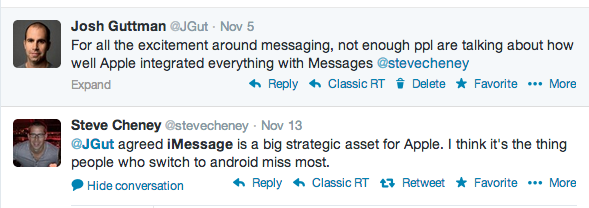
I switched back to Android last month, after 3-4 years on iOS, which started in 2009 with this blog post. The change was driven by curiosity more than anything, plus a new phone someone sent me as a gift didn't hurt. It's been well documented in the media, but the Android platform has come a long way since I last used it as my primary mobile device. It's still comparatively raw and requires more customization than iOS to achieve similar levels of productivity, but I think it has more potential to grow and evolve as a result.
A few general observations on features and user experience:
The Play Store / Wireless app download - Google rolled out some of these features
before I left Android for iOS, but the Play Store has evolved into a fully functional marketplace. Still not as robust or polished of an experience as iTunes, but wireless app download from desktop to mobile is hugely convenient and I find it surprising iOS hasn't done to this.
Intelligence of Android OS - There's an incredible amount of predictive intelligence built into the Android operating system. This is a particularly noticeable change since my last experience with the platform. Google Now is game-changing. Last Saturday night, my phone told me it was time to leave for dinner, 20 minutes before our reservation. It knew where we were planning to eat through some combination of data from OpenTable + Calendar. This is a killer feature and there are others along these lines that make Android fun and engaging.
Custom Launchers - For the past two weeks, I've used Aviate as the launcher to manage the UI of my phone. It's the best of the 3-4 launchers I tested and improves workflow and efficiency considerably. The ability to customize the UI - including allowing carriers to pre-install "junk" - is a key differentiator between iOS and Android, but Aviator does a great job purifying the UI a la Apple. My friends at Google tell me changes to these policies, implementing more standards may be coming.
App Design - I think the same flexibility that allows for customization of the UI, allows for greater flexibility in app design on Android vs iOS. The sandbox is more open and developers can iterate and push updates faster. With a few of my heaviest used apps, I see more inspired design on Android, including smart uses of the larger screen sizes. I suspect this may help Android grow and differentiate itself even further over time.
With the rawness and flexibility comes a few areas that desperately need improvement. The two biggest holes in usability for me are SMS functionality and Contact search. Fred wrote a good post on the problems with the Hangouts implementation on Android. Hangouts is the logical answer to Apple's iMessage, but it's performance is so horribly slow that it's unusable. I hear Google is pushing a major update soon, but until they fix it I'm enjoying Hello SMS. Even after the update to Hangouts, I suspect this will remain an issue and key difference between the two platforms for some time. I've debated this issue on Twitter in the past:
Contacts is the other app that seems obvious, but is missing for me on Android. iOS makes it incredible easy to search, share and utilize your address book, which is one of my heaviest used apps. Seems like an easy thing to fix and I hope Android does this soon.

